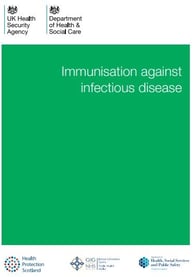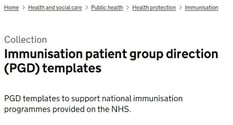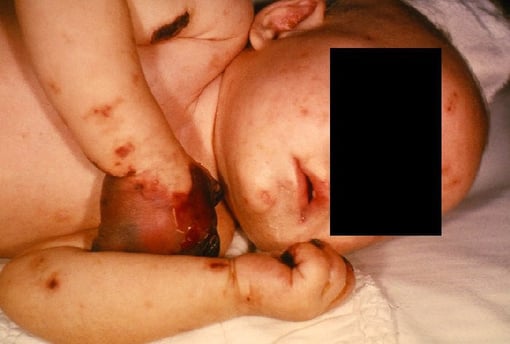Other useful links and further reading:
FOR THE GONORRHOEA MENB VACCINE PROGRAMME INFO PLEASE GO TO THE GONORRHOEA PORTAL
Useful resources for health professionals from meningitis.org
Slide set: MenACWY programme training slides for healthcare professionals - Government slides, not mine!
Slide sets: MenACWY training slides
Programme guidance: Men ACWY programme information for healthcare professionals
Programme guidance: Men B programme information for healthcare professionals
Meningococcal disease: guidance, data and analysis: The characteristics, diagnosis, management, surveillance and epidemiology of meningococcal disease.
Recent Updates & News
23rd June 2025: Information updated about the meningococcal B (MenB) vaccine and paracetamol use. Updated to reflect the change in timing of MenB doses to 8 and 12 weeks of age in line with the changes to the routine childhood immunisation programme from 1 July 2025
12th June: a new Green Book chapter for meningococcal has been published alongside the current one in anticipation of next month.
9th June: Meningococcal B: vaccine information for healthcare professionals updated today.
6th June 2025: MenACWY programme: information for healthcare professionals updated along with a fresh new set of slides (also linked above). The MenB equivalent has also been updated today to align with the changes to the childhood immunisation schedule from 1 July 2025, moving second MenB dose to 12 weeks from 16 weeks.
5th June 2025: PGD template updates: Hib/MenC, MenACWY risk groups, MenB, and MenACWY.
30th April: A BIG update came along today - the 'changes to the routine childhood schedule letter'. Big read with lots of changes to absorb. I won't repeat it all here but do have a good read.... some of this relates to MenC and MenB on the childhood prog. (see UKHSA webinar link on news page in June and consider registering for more info). Expect Green Book updates, PGD changes and perhaps a small amount of chaos while we adapt to the changes. Keep calm and keep the kettle on....
24th April 2025: Meningitis is certainly in the spotlight for pilgrims lately. This news item appeared today: UKHSA urges Hajj and Umrah pilgrims to get meningitis vaccination. UKHSA has confirmed 5 cases of MenW disease between February and March 2025 in people who had recently returned from KSA or in their close contacts in England and Wales.
11 April 2025: The WHO highlighted 17 confirmed cases from multiple countries of invasive meningococcal disease linked with travel to Saudi Arabia for religious pilgrimages. Initial reports from the KSA highlighted 11 cases in unvaccinated pilgrims who performed Umrah in the KSA between 7 January and 18 March 2025. A further six cases were reported to the WHO in pilgrims recently returned from Umrah, with two of the six confirmed as serogroup W. NaTHNaC have reported on this here. Quite shocking to learn that As of 10 March 2025, the KSA authorities estimate that only 54% of international Umrah pilgrims had complied with meningococcal vaccination requirements.
31st March 2025: Meningococcal disease: guidance, data and analysis: updated! Lab case data from July to September 24 are published too (as of 27th march). Following the complete withdrawal of COVID-19 containment measures in England from July 2021, overall case numbers returned to pre-pandemic levels driven mainly by group B meningococcal disease. Cases due to the other capsular groups remained very low because of the highly effective indirect (herd) protection provided by the adolescent meningococcal ACWY vaccine programme introduced from August 2015, alongside direct protection in those vaccinated. The distribution of meningococcal cases by capsular group causing invasive meningococcal disease (IMD) between July and September 2024 is summarised in a table in the document but worth noting that Men B accounted for 85.4% of all cases (41 of 48), followed by MenW: 6.3% (3 cases), MenY: 2.1% (1 case), MenC: 2.1% (1 case) and MenE: 2.1% (1 case). There were no confirmed cases for any other capsular groups. There were 41 Men B cases confirmed between July and September 2024, compared to 45 cases in the corresponding period in 2023. Between July and September, Men B was responsible for 93.3% (28 of 30) of IMD cases in individuals under 25 years of age and 72.2% (13 of 18) of cases in individuals aged 25 years or older. All confirmed cases of MenW, MenY and MenC occurred in individuals aged over 25 years. The one case of MenE was aged between 5 and 9 years.
13th March 2025: Meningococcal B: vaccine information for healthcare professionals doc updated. The PDF version of this guidance has been replaced by an HTML version. The title has been changed to clearly distinguish this guidance from that for other programmes. The guidance includes updated epidemiological information, and the references to latex and black triangle labeling have been removed.
12th March 2025: 5-strain meningitis vaccine shows promise in very young kids (this is about the ACWYX vaccine although there is also talk around the ABCWY vaccine)
28th Feb 2025: GP contract 25/26: Cessation of Hib/MenC 12-month dose effective from 1 July 2025 : Children who turn 12 months on or before 30 June 2025 will remain eligible for Menitorix® until stock levels are depleted, then the infant should be offered a Hexavalent vaccine (to replace the 12-month Hib dose). Children who turn 12 months on or after 1 July 2025 will not be offered a 12-month Hib/MenC vaccine but instead will receive a routine Hexavalent dose at a new 18-month appointment. This change will start from 01 January 2026 when the new 18-month visit will begin in the childhood vaccination schedule.
15th Feb 2025: Penmenvy, GSK’s 5-in-1 meningococcal vaccine, approved by US FDA to help protect against MenABCWY
29th Jan 2025: PGD template to support the provision of MenACWY vaccine to individuals with underlying medical conditions updated
22nd Jan 2025: Patient group direction (PGD) template to support the provision of MenB vaccine to individuals with underlying medical conditions AND the routine PGD updated.
22nd Jan 2025: The left thigh is no longer specified for Men B vaccination in either the Complete immunisation schedule or the Routine Childhood immunisation schedule. The Men B training and healthcare professional resources are currently being updated and will include the same information.
28th Nov 2024: Good news regarding Men C, but not so good for Men B... Press release: UK on brink of defeating meningococcal C
12th Nov 2024: The guidance for managing meningococcal disease has had some updates lately - in September there was a big update, and then in October there was an addition about the sharing of Shisha, and this month the ciprofloxacin section was updated.
JUNE 2024 Information for healthcare professionals updated to reflect vaccine changes on adolescent programme
May 2024 MenQuadfi to be used instead of Nimenrix for the routine adolescent programme from Sept 1st 2024. Should save a bit of time as it's a bit easier to prepare! Winner. Routine immunisation schedule poster changed on 1st July 2024 to reflect this change in procurement.
JUNE 2023 PGD template ACWY updated
JUNE 2022 JCVI discussions started around Menitorix being discontinued, largely because of the success of the adolescent ACWY programme. Check out the JCVI minutes and keep an eye on program change announcements...
MAY 2022 Green book chapter update - hello MenQuadfi and Trumenba
4 month old baby with gangrene of hands due to meningococcemia. Image reference on hyperlink on photo. Click on it to see more pictures (if you dare).
Bits and bobs to casually drop into conversation
Did you know....
There are 13 different types of the bacterium. Six of these - types A, B, C, W, X and Y - cause most of the disease cases worldwide.
The most common types in the UK are B, C, W and Y.
Since the MenC vaccine was introduced in the UK in 1999, there has been a big fall in MenC cases.
Most of the cases in the UK are currently caused by type B.
Since 2009, cases of MenW disease have been on the increase in the UK
Overall, 1 in 20 cases of meningococcal disease result in death. Death rates are higher for teenagers and young adults.
1 in 5 survivors have permanent effects such as skin scars, limb amputation(s), hearing loss, seizures and brain damage.
Between 5% and 11% of adults carry the bacteria in their throats asymptomatically. In teenagers this rate rises to 25%,
All visitors to the Hajj and Umrah pilgrimages in Saudi Arabia need proof that they have been vaccinated against type A, C, W and Y meningococcal disease.














